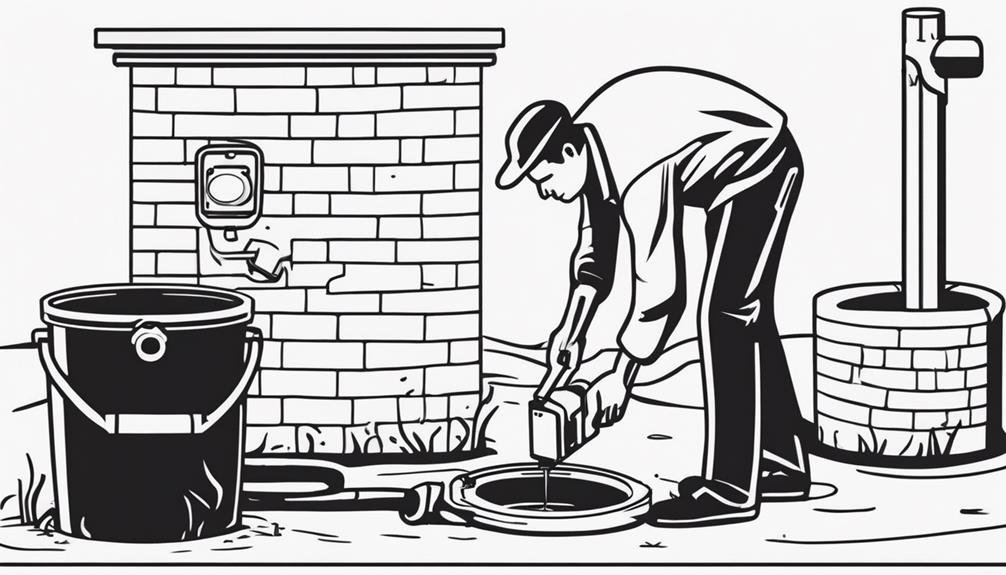Did you know that according to the Environmental Protection Agency, about one in five households in the United States rely on a septic system for wastewater treatment? Maintaining your septic tank properly is crucial to prevent costly repairs and ensure its longevity.
By following some easy do-it-yourself tips, you can keep your septic system running smoothly without having to constantly worry about potential issues. From understanding your septic system to monitoring water usage, these simple steps can save you time, money, and headaches in the long run.
Key Takeaways
- Regularly pump your septic tank every 3-5 years to prevent system failure.
- Monitor waste disposal to avoid clogs; use biodegradable products and manage grease and food scraps.
- Keep an eye on water usage, fix leaks promptly, and employ professional help for inspections.
- Maintain drain fields by avoiding deep-rooted plants, addressing issues promptly, and seeking professional service when needed.
Understanding Your Septic System

To properly maintain your septic system, you must first understand its components and how they work together to manage household wastewater. Your septic system consists of four main parts: the pipe from your house, the septic tank, the drainfield, and the soil.
The pipe from your house carries all the wastewater from your sinks, toilets, showers, and washing machines into the septic tank. Once inside the tank, the solid waste settles at the bottom, while the lighter materials like oil and grease float to the top. Bacteria in the tank break down the solid waste. The liquid wastewater then flows out of the tank and into the drainfield, where it's further treated by the soil.
To maintain your septic system properly, it's crucial to be mindful of what goes down your drains, perform regular inspections, and pump your tank every 3-5 years. Avoid flushing non-biodegradable items like wipes or sanitary products, as they can clog your system. By understanding these septic system components and following these maintenance tips, you can ensure your system operates efficiently and lasts for many years.
Regular Pumping Schedule
Maintain a regular pumping schedule for your septic tank to prevent buildup and ensure optimal system performance. Neglecting this crucial aspect can lead to costly repairs and potential health hazards.
Follow these steps to keep your septic system in top condition:
- Frequency: Pump your septic tank every 3-5 years, depending on household size and water usage.
- Professional Inspection: Have a professional inspect your tank regularly to assess its condition and recommend appropriate pumping intervals.
- Septic Odors: If you notice foul odors around your septic tank or drain field, it may be a sign that pumping is overdue.
- Tank Inspection: Regularly inspect the tank for signs of sludge accumulation, such as slow drains or gurgling sounds. Addressing these issues promptly can prevent system failure.
Proper Waste Disposal Practices

Regularly monitoring the type and quantity of waste entering your septic system is essential for its proper function and longevity. As a responsible homeowner, it's crucial to be mindful of what goes down your drains. Avoid flushing non-biodegradable items such as wipes, sanitary products, and paper towels, as these can clog your system. Opt for eco-friendly alternatives like biodegradable soaps and detergents to reduce the impact on your septic tank and the environment.
Additionally, be cautious with what goes into your garbage disposal. Grease, oils, and fats should never be poured down the drain as they can solidify in the system, leading to blockages. Instead, collect them in a container and dispose of them in the trash. Food scraps should also be minimized to prevent overloading your septic tank.
Monitoring Water Usage
For efficient septic tank maintenance, closely monitoring your household water usage is crucial to prevent overloading the system and ensure its optimal performance. Here are some key tips to help you effectively manage your water consumption and detect leaks:
- Water Conservation: Be mindful of water usage by fixing any dripping faucets, installing low-flow toilets and showerheads, and spreading out laundry loads throughout the week to avoid excessive water entering the septic system.
- Regular Inspection: Keep an eye out for any signs of water leaks, such as wet areas in the yard, unexplained increases in water bills, or the sound of running water when no fixtures are in use.
- Monitor Water Meter: Periodically check your water meter reading, then avoid using any water for a few hours. If the meter reading changes during this time, it could indicate a hidden leak.
- Professional Inspection: Consider hiring a plumber to conduct a thorough inspection of your plumbing system to detect and repair any leaks promptly, preventing water wastage and potential septic system overload.
Maintaining Drain Fields

To ensure the proper functioning of your septic system, it's essential to implement proactive measures for the upkeep of your drain fields. Maintaining your drain fields is crucial for the overall health of your septic system. One key aspect of drain field maintenance is proper landscaping. Avoid planting deep-rooted trees or shrubs near the drain field area, as their roots can infiltrate and damage the pipes. Instead, opt for grass or shallow-rooted plants.
Regularly inspect the drain field area for any signs of standing water or unpleasant odors, as these could indicate a problem with the drainage system. If you notice any issues, it's important to address them promptly to prevent further damage. In case of emergency repairs, such as sewage backup or flooding in the drain field area, contact a professional septic system service provider immediately.
Frequently Asked Questions
Can I Use Septic Tank Additives to Improve the Efficiency of My System?
You can use septic tank additives, but be cautious. Pros include potential odor control and enhanced bacterial activity. However, cons like possible damage to the system exist. Consider DIY maintenance for cost-effective solutions before opting for additives.
How Often Should I Have My Septic Tank Inspected by a Professional?
You should have your septic tank inspected by a professional every 3-5 years. Regular inspections ensure optimal performance, prevent costly repairs, and safeguard your property's sanitation. Professional assessments detect issues early, maintaining your system's efficiency and longevity.
What Are Some Signs That My Septic System May Be Failing?
If you notice septic system odors or see signs of drain field saturation, your septic system may be failing. Address these issues promptly to prevent further damage and ensure your septic tank functions properly.
Can I Plant Trees or Shrubs Near My Septic System Without Causing Damage?
You can plant trees and shrubs near your septic system, but be cautious. Consider landscaping restrictions and soil composition. Tree roots could infiltrate pipes or disrupt the tank. Proper placement and regular checks are crucial.
Are There Any DIY Methods for Unclogging a Septic System if It Becomes Backed Up?
If your septic system backs up, there are DIY emergency solutions. Before it becomes a problem, consider preventative septic care and maintenance techniques. Regular pumping and avoiding flushing harmful substances can help prevent clogging issues.
Conclusion
In conclusion, proper septic tank maintenance is crucial for a healthy and efficient system. By following a regular pumping schedule, practicing proper waste disposal, monitoring water usage, and maintaining drain fields, you can ensure your septic system functions smoothly like a well-oiled machine.
Remember, taking care of your septic system is like tending to a garden – with regular attention and care, it will continue to thrive and serve you well.

